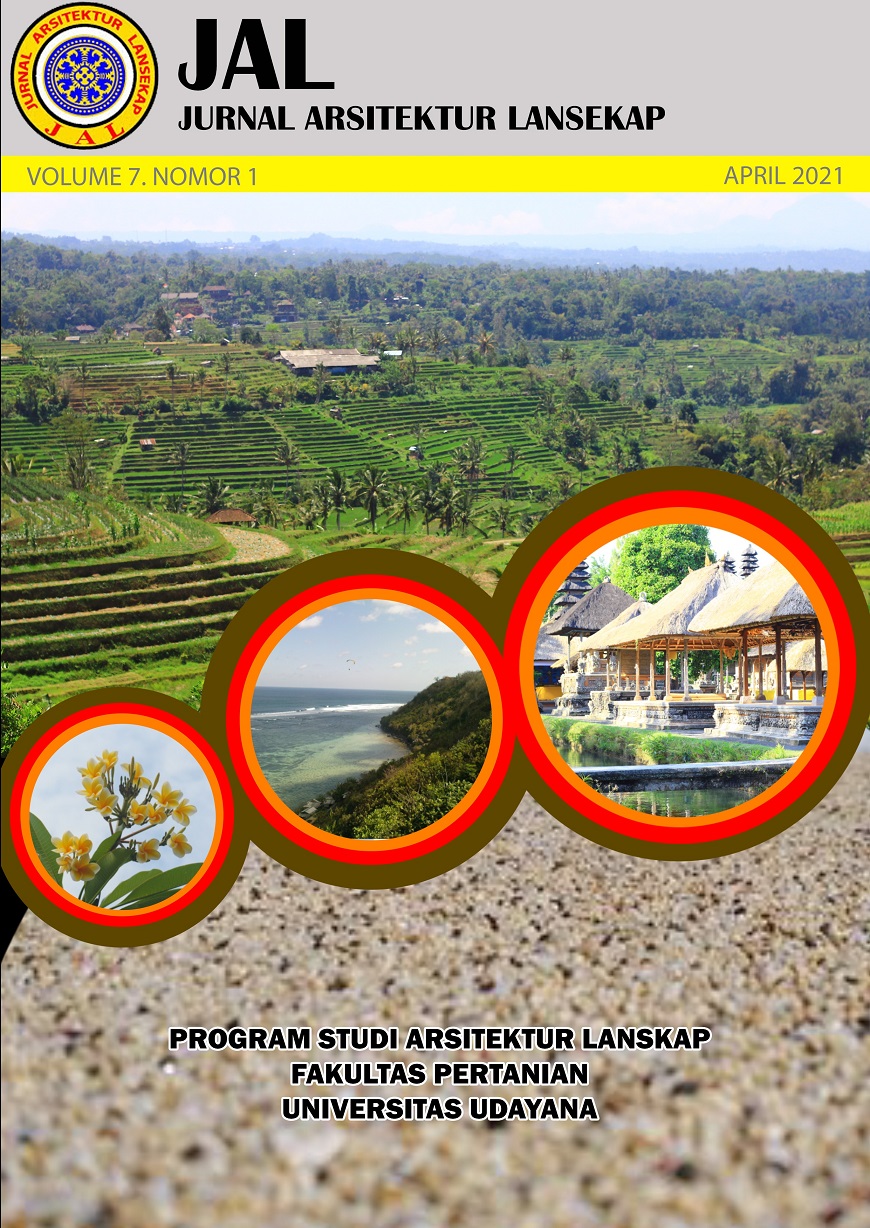Studi komparasi traffic island Taman Titi Banda dengan traffic island Taman Dewa Ruci di Bali
Abstract
Traffic islands are parts of roads that cannot be passed by motorized vehicles, which include sidewalks, garbage dumps, plants, utilities, and signs. The traffic island park Titi Banda in Denpasar and the traffic island garden Dewa Ruci in Kuta have both the function of a traffic island and a landmark. Currently, the two traffic islands are getting additional functions, as a place for recreation and a place to turn around for vehicles.The purpose of this study are to inventory the existing conditions at both sites, compare the two traffic islands, and provide appropriate recommendations to maintain the main function of the two traffic islands. The method used in this research is a survey method, data collection method through observation, questionnaires and interviews. The results showed that the traffic island design for the Titi Banda park and the traffic island for the Dewa Ruci park were not in accordance with the references or regulations regarding traffic islands and roads. The existing conditions on both sites are divided into hardscape elements and softscape elements. Comparisons are made on the two traffic islands in terms of pedestrians, entrance access, vegetation and road facilities by referring to regulations, and literature related to traffic island. The recommendations given include the addition of block tiles and warning tiles for pedestrians, entry access, replacement of vegetation, and providing road facilities that can provide a sense of security and comfort for pedestrians and road users. In addition, the recommendations given can maintain the main function of the site as a traffic island and landmark for the island of Bali and increase convenience for road users and pedestrians.
Downloads
References
Departemen Pekerja Umum Direktorat Jendral Bina Marga. 1995. Tata Cara Perencanaan Teknik Lanskap Jalan.
Departemen Pemukiman dan Prasarana Wilayah. 2002. Tata Cara Perencanaan Geometrik Persimpangan Sebidang.
Departemen Perhubungan. 2014. Panduan Penempatan Fasilitas Perlengkapan Jalan.
Menteri Pekerjaan Umum. 2011. Peraturan Menteri Pekerjaan Umum Nomor : 19/PRT/M/2011 Tentang Persyaratan Teknis Jalan Dan Kriteria Perencanaan Teknis Jalan.
Menteri Pekerjaan Umum. 2012. Peraturan Menteri Pekerjaan Umum Nomor 05/PRT/M/2012 tentang Pedoman Penanaman Pohon Pada Sistem Jaringan Jalan.
Menteri Pekerjaan Umum dan Perumahan Rakyat. 2017. Pedoman Bahan Konstruksi Bangunan dan Rekayasa Sipil: Perencanaan Teknis Fasilitas Pejalan Kaki.
Menteri Perhubungan Republik Indonesia. 2018. Peraturan Menteri Perhubungan Republik Indonesia Nomor PM 82 Tahun 2018 tentang Alat Pengendali dan Pengaman Pengguna Jalan.
Pramono, D. T., T. Mustikawati., & S. T. Pamungkas. 2012. Bangunan Pusat Konvensi sebagai Landmark Kawasan Tenggara Kota Malang. Jurnal Arsitektur UB 4(2):1–8.
Sudjana. 2001. Metoda Statistika. Bandung: PT. Tarsito Bandung.
An author who publishes in the Jurnal Arsitektur Lansekap (JAL) agrees to the following terms:
- Author retains the copyright and grants the journal the right of first publication of the work simultaneously licensed under the Creative Commons Attribution-ShareAlike 4.0 License that allows others to share the work with an acknowledgement of the work's authorship and initial publication in this journal
- Author is able to enter into separate, additional contractual arrangements for the non-exclusive distribution of the journal's published version of the work (e.g., post it to an institutional repository or publish it in a book) with the acknowledgement of its initial publication in this journal.
- Author is permitted and encouraged to post his/her work online (e.g., in institutional repositories or on their website) prior to and during the submission process, as it can lead to productive exchanges, as well as earlier and greater citation of the published work (See The Effect of Open Access).
Read more about the Creative Commons Attribution-ShareAlike 4.0 Licence here: https://creativecommons.org/licenses/by-sa/4.0/.







